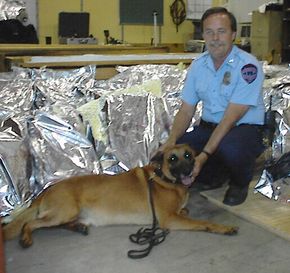Dogs On Patrol
Why do we bother using police dogs at all? For one thing, their sense of smell is almost 50 times more sensitive than a human's. A dog can sniff out criminals, drugs, weapons, and bombs in situations where a human officer would have to search every inch, a dangerous task. In one case, Breston, a Belgian Malinois who works with the Cheektowaga Police Department in Cheektowaga, NY (a suburb of Buffalo), easily sniffed out a shipment of marijuana in heat-sealed Mylar bags, inside plastic-lined crates sealed with foam sealant, inside a closed storage garage. With his sensitive nose and a search warrant, Breston kept $3,400,000 worth of drugs off the streets.
In addition to sensitivity, a dog's sense of smell is picky. It can discern a specific scent even when there are dozens of other scents around. Drug smugglers have tried to fool drug-sniffing dogs by wrapping drugs in towels soaked with perfume, but the dogs find the drugs anyway.
Advertisement
A police dog's work isn't all about his nose, though. The intimidating growl of a well-trained German shepherd can cause many criminals to surrender instead of running or fighting. "When I bring out the dog, all of a sudden they know they can't reason with him, they can't intimidate him, they can't try to scare him," said Officer Dan Smith, Breston's handler. The very presence of a police dog can prevent physical confrontations.
When a conflict does arise, dogs are faster and stronger than most humans, able to catch a fleeing criminal and clamp down with powerful jaws to apprehend the suspect until other officers arrive. Dogs have more than earned their place in the police forces of the world.
